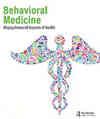西班牙新冠肺炎一年,心理和身体健康纵向研究。
IF 2
4区 医学
Q3 BEHAVIORAL SCIENCES
引用次数: 2
摘要
这项对同一参与者进行的纵向研究的目的是调查新冠肺炎大流行在一年中对情感、心理健康、抑郁和身心健康水平的影响,其中第一次测量于2020年3月进行(M1),第二次测量于2021年3月(M2),以及了解这些水平从M1到M2的演变。两种测量(M1和M2)之间分析的变量的平均得分比较显示,在以下量表中存在显著差异:积极情感(PANAS),M2的得分较低;全面抑郁(BDI-II)和两种认知情感和躯体动机因素,M2得分较高;身体功能、角色身体、活力、社会功能、角色情感和心理健康的身心健康量表(SF-36),以及两个身体和心理健康组成部分,所有这些部分的M2得分都较低;以及生活目的量表,M2分较低。我们可以得出结论,一年的疫情影响了这项工作中分析的所有变量,显示出积极影响的减少,抑郁量表的得分增加,身心健康状况恶化,心理健康状况下降。在整个疫情年,研究结果表明,年龄对身体动机因素和全面抑郁、身体功能、活力和角色情绪量表有适度影响。性别对所分析的四个变量中的任何一个都没有调节作用。本文章由计算机程序翻译,如有差异,请以英文原文为准。
One Year of COVID-19 in Spain, Longitudinal Study on Mental and Physical Health.
The objective of this longitudinal study carried out with the same participants, with two repeated measurements, the first taken in March 2020 (M1) and the second measurement in March 2021 (M2), is to investigate the impact of the COVID-19 pandemic throughout one year on the levels of Affect, Psychological Well-being, Depression and Mental and Physical Health, as well as to learn about the evolution of those levels from M1 to M2. Comparison of the mean scores of the variables analyzed between the two measurements (M1 and M2) show significant differences in the following scales: Positive Affect (PANAS), with lower scores at M2; Total Depression (BDI-II) and the two Cognitive-Affective and Somatic-Motivational factors, with higher scores at M2; the physical and mental health scales (SF-36) of Physical Functioning, Role Physical, Vitality, Social Functioning, Role Emotional, and Mental Health, and the two Physical and Mental Health components, with lower scores at M2 in all of them; and the Purpose in Life (PWB) scale, with a lower score at M2. We can conclude that the one-year pandemic situation has affected all the variables analyzed in this work, showing a decrease in positive affect, an increase in the score of the depression inventory, worse physical and mental health, and less psychological well-being. Throughout the pandemic year, the results show that age has a moderation effect on the Somatic-Motivational factor and on the Total Depression, Physical Functioning, Vitality, and Role Emotional scales. Gender shows no moderation effect on any of the four variables analyzed.
求助全文
通过发布文献求助,成功后即可免费获取论文全文。
去求助
来源期刊

Behavioral Medicine
医学-行为科学
CiteScore
5.30
自引率
4.30%
发文量
44
审稿时长
>12 weeks
期刊介绍:
Behavioral Medicine is a multidisciplinary peer-reviewed journal, which fosters and promotes the exchange of knowledge and the advancement of theory in the field of behavioral medicine, including but not limited to understandings of disease prevention, health promotion, health disparities, identification of health risk factors, and interventions designed to reduce health risks, ameliorate health disparities, enhancing all aspects of health. The journal seeks to advance knowledge and theory in these domains in all segments of the population and across the lifespan, in local, national, and global contexts, and with an emphasis on the synergies that exist between biological, psychological, psychosocial, and structural factors as they related to these areas of study and across health states.
Behavioral Medicine publishes original empirical studies (experimental and observational research studies, quantitative and qualitative studies, evaluation studies) as well as clinical/case studies. The journal also publishes review articles, which provide systematic evaluations of the literature and propose alternative and innovative theoretical paradigms, as well as brief reports and responses to articles previously published in Behavioral Medicine.
 求助内容:
求助内容: 应助结果提醒方式:
应助结果提醒方式:


